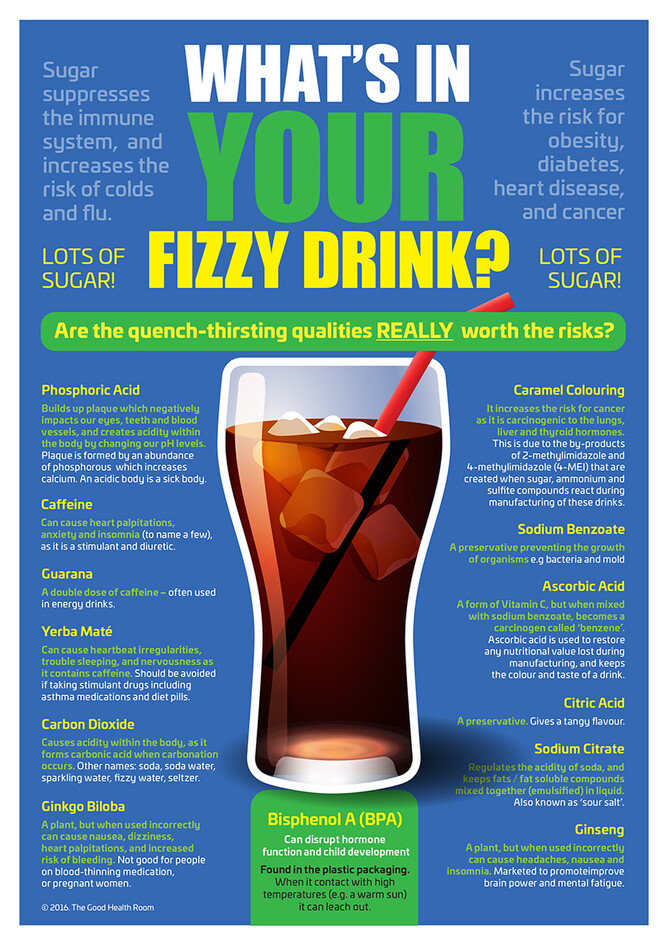Article written by Shona Mackenzie (Naturopath & Medical Herbalist) | ||
|---|---|---|
KEY POINTS:
Sugar disrupts homeostasis in the body
Sugar causes the immune system to become exhausted allowing illnesses and disease to occur
There are many known carcinogenic chemicals in fizzy drinks
Sugar increases the risk for diabetes, obesity, heart disease, and cancer
Diseases linked to fizzy drink consumption | |
|---|---|
|
|
• Asthma | • Allergies |
• Cancer | • Cardiovascular Disease |
• Epilepsy | • Mental Health |
• Tourette Syndrome | • Headaches & Migraines |
• Gout | • Hypertension |
• Obesity | • Metabolic Syndrome |
• Non-Alcoholic | • Hypokalemia |
• Reproductive Problems | • Tooth Decay |
• Osteoporosis | • Type 2 Diabetes |
• Urinary Stones | • Kidney Stones |
• Kidney Disease | • Overactive Bladder |
HOW DO YOU KNOW IF YOU'RE ADDICTED? | ||
|---|---|---|
You need a fizzy drink to make you feel good – as the physiological desire for caffeine and sugar comforts you. Without it, you are not able to function properly, and healthy whole foods all taste bland.
If you think your addicted, or need help with any of the above illnesses or disorders relating to a possible fizzy-drink addiction, then please get in touch with The Good Health Room – we can give you the help, knowledge and skills to get your health back on track!
SUGAR IN THE BODY | ||
|---|---|---|
In the history of the human diet, refined sugar as consumed today, was never part of the daily intake of food. Our bodies are continually striving to maintain homeostasis (the ongoing process the body maintains to keep balance for complete effective function).
Too much daily sugar hinders this process dramatically, which long-term means the constant re-balancing will cause detrimental health problems. Sugar greatly affects our mineral balance e.g. magnesium, calcium, potassium, zinc, iron – causing an excess of some, and deficiency of others. Our minerals were created to work together to perform the perfect homeostasis – however sugar disrupts this process, so within time the progression of illness begins.
A deficiency in minerals = digestive enzymes not functioning correctly. When digestive enzymes don't function your food is not digested completely, which in turn allows undigested protein molecules (and other particles), to enter into your bloodstream. This triggers an immune response as the immune system views these foreign substances as intruders, and so it quickly escorts them out of the body. However, when the immune system works continually to counteract this problem, it soon becomes exhausted and therefore extremely inefficient in function = ongoing illnesses and degenerative diseases.
WHAT ARE THE INGREDIENTS IN FIZZY DRINKS? | ||
|---|---|---|
For a lot of people, sugar consumption is often only associated as to whether they've added white granules to their hot drinks. This is obviously not the case – understanding what sugar is, and where it is found is a whole different topic.
When sugar is consumed without fibre (e.g. not like it is in a piece of fruit), it suppresses the immune system. The sugar in fizzy drinks contains no fibre. The ingredients you will find in common fizzy drinks generally contain carbonated water, sweetener, and chemicals.
Sugar options used:
Table Sugar (Sucrose)
High-Fructose Corn Syrup (HFCS)
Maltodextrin
Crystalline Fructose
Honey
Maple Syrup
Sugar substitutes (the alternatives to sugar) are generally low calorie, calorie-free, natural, or artificial, and used to match the taste of sugar. These sugar-substitute sweeteners are controversial with many people sitting on different sides of the fence, however artificial sweeteners are not whole foods, and the body struggles to either eliminate them or find a use for them.
Sweeteners used:
Aspartame (NutraSweet, Equal)
Acesulfame Potassium / Acesulfame K, Ace K (Sweet One, Sunnett)
Saccharin (Sweet'N Low)
Sucralose (Splenda)
Neotame
Sugar alcohols (sorbitol, xylitol, malitol, erythritol, mannitol)
Side effects that some sweeteners cause, include migraines, headaches, disruption of the balance and diversity of gut microflora (which is essential for optimal health and a strong immune system), and weight gain. Particular negative effects have been shown in diabetics, children, women of childbearing age, pregnant or breastfeeding and those with low seizure thresholds.
Ingredients used:
Phosphoric Acid – gives a tangy flavour and maintains carbonation (more phosphorous in the body creates too much calcium which is not used, and therefore becomes plaque). Plaque negatively impacts our eyes, teeth and blood vessels, and creates acidity within the body by changing our pH levels – an acidic body is a sick body.
Caffeine – a stimulant and diuretic that can cause heart palpitations, anxiety, insomnia, malabsorption of nutrients, increased risk of high cholesterol and blood pressure, and removes calcium from the bones (to name a few).
Guarana – a double dose of caffeine and used in energy drinks
Yerba Maté – contains caffeine and can cause heartbeat irregularities, trouble sleeping, nervousness, should be avoided if taking stimulant drugs including asthma medications and diet pills
Carbon Dioxide (soda, soda water, sparkling water, fizzy water, seltzer) – forms carbonic acid when carbonation occurs, which causes acidity
Caramel Colouring (Caramel IV) – found in Pepsi, Coke, Ice Tea. It increases the risk for cancer due to the by-products of 2-methylimidazole and 4-methylimidazole (4-MEI) – known to be carcinogenic to lungs, liver and thyroid hormones. It is created when sugar, ammonium and sulfite compounds react during manufacturing.
Citric Acid – gives a tangy flavour, and can act as a preservative
Sodium Citrate (sour salt) – regulates the acidity of soda, and keeps fats / fat soluble compounds mixed together (emulsified) in liquid.
Sodium Benzoate (preservative) – prevents the growth of organisms (e.g bacteria and mould)
Ascorbic Acid (form of Vitamin C) – restores any nutritional value lost during manufacturing, and keeps the colour and taste of a drink. Benzene (a carcinogen) can be created when ascorbic acid and sodium benzoate are combined.
Ginkgo Biloba (a plant) – can enhance memory and concentration, but if not used correctly can cause nausea, dizziness, heart palpitations, and increased risk of bleeding. It is not good for people on blood-thinning medication, or pregnant women.
Ginseng (a plant) – can enhance cognitive function (brain power and mental fatigue), but can also cause headaches, nausea and insomnia
Bisphenol A (BPA) – found in the plastic packaging of fizzy drinks and can leach out when in contact with high temperatures (e.g. leaving you fizzy drinks in the heat) – can disrupt hormone function and child development.
References | ||
|---|---|---|
Appleton, N., & G. N. Jacobs. (2011). Killer Colas: The hard truth about soft drinks.
http://drhoffman.com/article/sugar-disease/#sthash...
http://www.ncbi.nlm.nih.gov/pubmed/20219526
http://www.ncbi.nlm.nih.gov/pubmed/27298490
http://www.ncbi.nlm.nih.gov/pubmed/27090230
Find us on | ||
|---|---|---|




